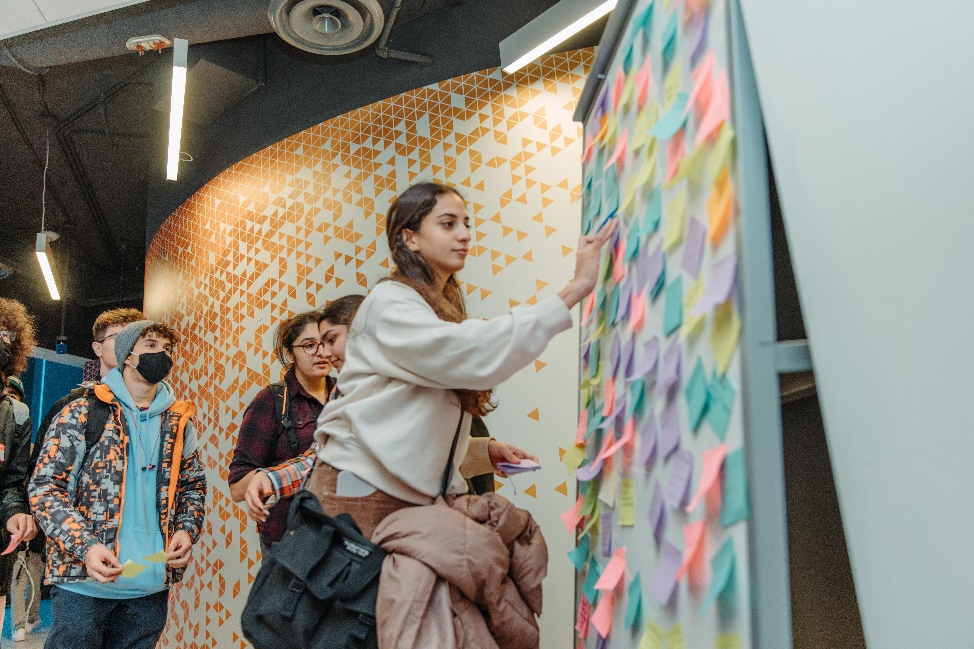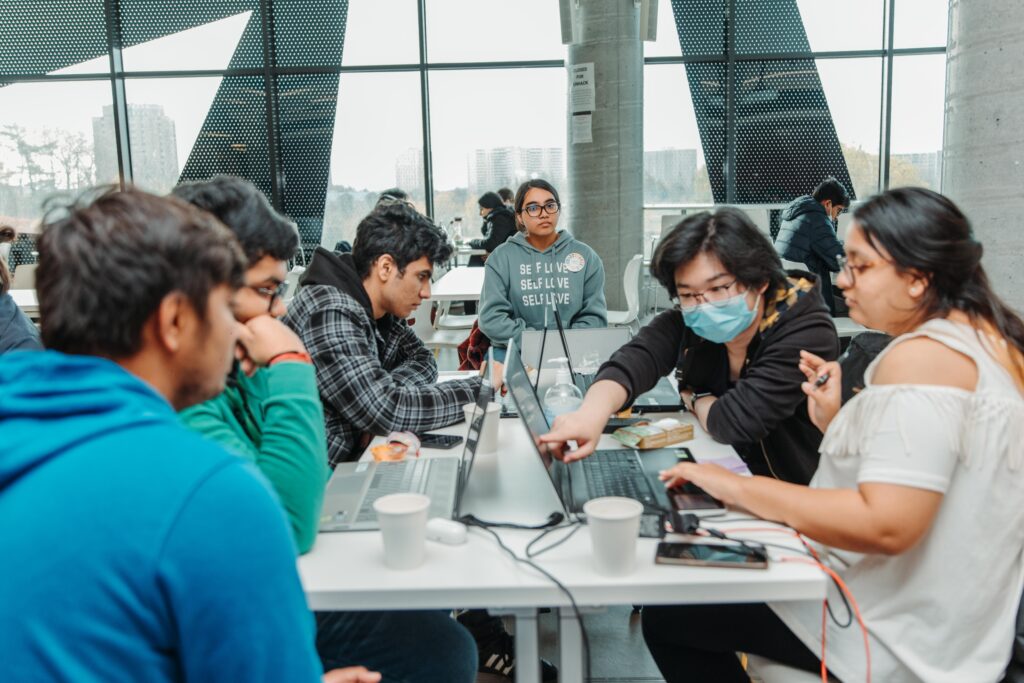Lassonde’s STEM programs reflect changing world
Tags:

This story originally appeared in the March 2023 Innovatus Issue of YFile. Written by Elaine Smith.
The Lassonde School of Engineering is changing the face of STEM education to ensure it aligns with the world of the future by breaking down systemic barriers and offering opportunities for inclusion, while building excitement about STEM throughout.
The journey begins with Lassonde’s k2i academy, an initiative that launched in 2020 and brings together an ecosystem of diverse partners to create more equitable outcomes for underrepresented youth (kindergarten to high school) in STEM.
“The k2i academy works intentionally with partners, including the K12 sector, to address systemic barriers that hinder students and staff in engaging with STEM,” said Lisa Cole, director of programming for k2i. “We bring people together to create an ecosystem for equity-focused innovation.”

k2i has received more than $5 million in funding from a variety of partners in government and the private sector. It works alongside publicly funded school boards and community organizations to leverage collective resources to create and implement programs that strategically remove roadblocks for students and families, inspire future innovators and creators, and build capacity for others to engage in this work.
“For example, the Bringing STEM to Life: Work-Integrated Learning program works with school board leaders to employ high school students while also working towards a high school physics credit,” said Michelle Tsui-Woods, k2i’s associate director of operations and development. “We know that students are not always taking the prerequisite courses they need to pursue STEM post-secondary studies and, at times, have to choose between work and learning. This program removes that barrier.”
Cole notes, “We are always working alongside educators, exploring how to push boundaries with cost-effective, flexible tools so schools can update their programs and invest to get beyond the status quo.”
As students consider their university options, the Lassonde Academy is on hand with a pre-university program that assists students in meeting the admissions requirements for STEM programs.
“The program began in 2015 and has evolved over time,” said Sean Billingsley, director of recruitment and admissions, who leads the Lassonde Academy. “Initially, it expanded the number of students to whom we could make offers and has pivoted to become a tool to help increase access for underrepresented students, especially those who identify as female.”
The Academy offers free, fully virtual, self-paced summer courses in chemistry, math and physics that students can pursue to boost their skills, build confidence in their capability and earn an offer from Lassonde. Although women were the initial target audience, the Academy is expanding to support other groups underrepresented in STEM fields.
“The courses are tools designed to help students be successful going forward,” Billingsley said. “We are not replicating high school courses; the content was designed to strengthen transitions to first year while also engaging diverse learners.”
The program courses are intentionally self-paced so prospective students can work around their other commitments. To date, more than 250 students have successfully completed the courses and proceeded to join Lassonde programs.
Once students enter Lassonde, administrators, faculty and staff are committed to keeping them engaged and inspired. Jeffrey Harris, an associate professor, is leading a project redesign of the common core of engineering courses, including the first year.
“These courses – about 30 credits – form a substantial part of the curriculum,” Harris said. “We’ve found that it’s not just about the curriculum; we need to think about the student experience and about education as an experiential journey for the learner.”
With the support of the Lassonde Educational Innovation Studio, he and a working group have spent two years researching and redesigning the common core using design principles, interviewing students, doing a global environmental scan, incorporating innovations and adjusting procedures. They’re looking toward a more project-based experience for their students and will run a pilot program in Fall 2023 for 70 first-year students.
The pilot will feature one course that runs throughout the semester with all the other courses offered sequentially in a more intensive fashion.
“We’ll pilot this with existing courses and it will inform larger change,” said Harris. “We’re evolving the way we think about higher education and setting a new standard.”
Lassonde students have other opportunities for enrichment, including the Bergeron Entrepreneurs in Science and Technology (BEST) program, administered by program manager Maedeh Sedaghat.
The BEST Program offers students the environment, culture and resources to learn how they can use technology to solve societal challenges, become creators and grow as entrepreneurs. One of its main pillars is experiential education, such as UNHack and BEST Startup Experience (BSE); both are designed to empower students to develop essential skills like teamwork, critical thinking, creative problem solving, communications and decision-making.
UNHack revolves around the United Nations Sustainable Development Goals (UN SDGs), challenges that underpin the University Academic Plan. During UNHack and BSE, students go through a structured learning journey using design sprint methodology and work in multi-disciplinary teams over a weekend to create innovative solutions to sustainability challenges proposed by community partners from across York University and beyond. All student teams get support from their dedicated mentors throughout the experience and present their solution ideas to a panel of judges. Winning projects will have access to additional support like coaching, resources for prototyping, and lab space to take their project to the next level and turn it into a startup.
Other opportunities offered by the BEST Program include the BEST Certificate, BEST entrepreneurial co-op, and the BEST entrepreneurial Work Integrated Learning where students get to develop entrepreneurial mindset and learn how to play a greater role in the management of technological innovation in larger organizations or start their own ventures.
“This is a safe space for students to experiment, explore their passions and strengths and achieve their full potential,” said Sedaghat. “Our programs provide students with multi-disciplinary education and experiences so they have the foundation, skills, knowledge and tools to feel confident in making big impacts in their communities and beyond.”
Jane Goodyer, dean of the Lassonde School of Engineering, is justifiably proud of this suite of programs.
“The work we do to increase engagement and interest in STEM is incredibly rewarding – whether it’s sparking initial interest among youngsters who never dreamed they could be engineers; providing a helping hand to prospective students; or facilitating the richest possible educational experiences for our current students,” Goodyer said.
“To improve the world for everyone – our ultimate goal – we need different perspectives and approaches to global engineering and science problems. That only begins by making STEM education accessible to all and cultivating interdisciplinary connections through which our diverse creators can collaborate in making positive change.”